
Nudge
Phill Agnew
- 26 minutes 33 secondsCan you see the invisible gorilla?
75% of us expect to spot the unexpected. But we’re wrong. Today on Nudge, Dan Simons shares his results from perhaps the world’s best-known psychology experiment: the Invisible Gorilla. Listen, and you’ll take part in our own audio version of his experiment, and I'll dig into research papers to learn how Dan’s findings apply to marketing.
Dan’s book Invisible Gorilla: https://www.theinvisiblegorilla.com/
Dan’s book Nobody’s Fool: https://dansimons.com/NobodysFool.html
Outdoor Advertising Recall study: https://tinyurl.com/5e8s5nwv
Subscribe to the (free) Nudge Newsletter: https://nudge.ck.page/profile
20 January 2025, 6:30 am - 31 minutes 18 secondsFrancesca Gino Scandal: What Really Happened
The Francesca Gino scandal shook the academic world, exposing fraudulent research practices at one of the world’s most prestigious institutions, Harvard Business School. This episode unpacks the details of the case, from the initial discoveries to the implications for science.
You’ll learn:
How a PhD student uncovered data manipulation in a high-profile study (feat. Zoe Xani’s investigation).
The critical role of whistleblowers in exposing fraud (feat. Data Colada’s analysis).
Key findings from Harvard’s 1,300-page report on research misconduct.
Which studies were faked and what they claimed to find.
How self-correcting mechanisms can strengthen trust despite scandals.
----
Sign up to my newsletter: https://www.nudgepodcast.com/mailing-list
Connect on LinkedIn: https://www.linkedin.com/in/phill-agnew-22213187/
Watch Nudge on YouTube: https://www.youtube.com/@nudgepodcast/
----
Sources:
Data Colada. (2023). [109] Data falsificada (Part 1): “Clusterfake”. https://datacolada.org/109
Data Colada. (2023). Data falsificada (Part 1): Evidence that Francesca Gino fabricated data. Data Colada. Retrieved from https://datacolada.org/110
Data Colada. (2023). Data falsificada (Part 3): The cheaters are out of order. Data Colada. Retrieved from https://datacolada.org/111
Data Colada. (2023). Data falsificada (Part 4): Forgetting the words. Data Colada. Retrieved from https://datacolada.org/112
Data Colada. (2024). [116] Our (first?) day in court. https://datacolada.org/116
Data Colada. (2024). [118] Harvard’s Gino Report Reveals How A Dataset Was Altered, Data Colada. https://datacolada.org/118
Dalton, R. (2023, October 18). Embattled Harvard honesty professor accused of plagiarism. Science. Retrieved January 6, 2025, from https://www.science.org/content/article/embattled-harvard-honesty-professor-accused-plagiarism
Dubner, S. J. (2024). Why is there so much fraud in academia? (Update) [Audio podcast episode]. In Freakonomics Radio. Freakonomics, LLC. https://freakonomics.com/podcast/why-is-there-so-much-fraud-in-academia-update/
Dubner, S. J. (2025). Can academic fraud be stopped? (Update) [Audio podcast episode]. In Freakonomics
Radio. Freakonomics, LLC. https://freakonomics.com/podcast/can-academic-fraud-be-stopped-update/
Gino, F., Kouchaki, M., & Galinsky, A. D. (2015). The moral virtue of authenticity: How inauthenticity produces feelings of immorality and impurity. Psychological Science, 26(7), 983–996. https://doi.org/10.1177/0956797615575277
Gino, F., & Wiltermuth, S. S. (2014). Evil genius? How dishonesty can lead to greater creativity. Psychological Science, 25(4), 973–981. https://doi.org/10.1177/0956797614520714
Gino, F., Kouchaki, M., & Casciaro, T. (2020). Why connect? Moral consequences of networking with a promotion or prevention focus. Journal of Personality and Social Psychology,
https://psycnet.apa.org/doiLanding?doi=10.1037%2Fpspa0000226
Harari, Y. N. (2024). Nexus: A brief history of information networks from the Stone Age to AI. Fern Press.
Judo, P. (2024). It’s over – Gino vs Harvard fake data scandal [Video]. YouTube. https://youtu.be/Q9tgyVPytBk
Konnikova, M. (2023). They studied dishonesty. Was their work a lie? The New Yorker. https://www.newyorker.com/magazine/2023/10/09/they-studied-dishonesty-was-their-work-a-lie
Lewis-Karus. (2024). How a scientific dispute spiraled into a defamation lawsuit. The New Yorker. https://www.newyorker.com/news/news-desk/how-a-scientific-dispute-spiralled-into-a-defamation-lawsuit
Shu, L. L., Mazar, N., Gino, F., Ariely, D., & Bazerman, M. H. (2012). Signing at the beginning makes ethics salient and decreases dishonest self-reports in comparison to signing at the end. Proceedings of the National Academy of Sciences, 109(38), 15197–15200. https://doi.org/10.1073/pnas.1209746109
17 January 2025, 6:50 am - 24 minutes 16 secondsCan I fool veteran marketers with my AI fakery?
I put AI to the test at one of the world’s largest marketing conferences, Inbound 2024. This episode dives into the surprising results of my experiment and what they mean for the future of marketing.
You’ll learn:
Why AI-generated content is seen as error-free (feat. 2022 study by Henestrosa et al.).
How AI compares to humans in persuading consumers (feat. 2023 meta-analysis).
Why strong positioning, like Wistia’s, is key to beating AI at its own game.
The marketing tasks most at risk of being taken over by AI (feat. 2024 survey).
A senior marketer’s take on whether AI could ever replace humans (feat. Richard Truncale).
----
Sign up to my newsletter: https://www.nudgepodcast.com/mailing-list
Connect on LinkedIn: https://www.linkedin.com/in/phill-agnew-22213187/
Watch Nudge on YouTube: https://www.youtube.com/@nudgepodcast/
----
Sources:
Henestrosa, A. L., Greving, H., & Kimmerle, J. (2022). Automated journalism: The effects of AI authorship and evaluative information on the perception of a science journalism article. Computers in Human Behavior, 138, 107445. https://doi.org/10.1016/j.chb.2022.107445
Huang, G., & Wang, S. (2023). Is artificial intelligence more persuasive than humans? A meta-analysis. Journal of Communication, 73(6), 552–562. https://doi.org/10.1093/joc/jqad024
Kasumovic, D. (2024). Artificial intelligence (AI) marketing benchmark report: 2024. Influencer Marketing Hub. https://influencermarketinghub.com/ai-marketing-benchmark-report/
Shotton, R. (2023). The illusion of choice: 16 ½ psychological biases that influence what we buy. Harriman House.
Chan, W. T. Y., & Leung, C. H. (2018). An empirical study on reverse psychology applied in advertising messages. Asian Journal of Empirical Research, 8(9), 321–329. https://doi.org/10.18488/journal.1007/2018.8.9/1007.9.321.329
13 January 2025, 6:30 am - 16 minutes 1 secondThe experiment every marketer should know
From curing scurvy to shaping billion-dollar business strategies, this is the story of the most important experiment in science and its profound impact on our world.
----
Sign up to my newsletter: https://www.nudgepodcast.com/mailing-list
Connect on LinkedIn: https://www.linkedin.com/in/phill-agnew-22213187/
Watch Nudge on YouTube: https://www.youtube.com/@nudgepodcast/
----
Inspired by the insights and storytelling of May Contain Lies How Stories, Statistics, and Studies Exploit Our Biases – And What We Can Do About It, authored by Alex Edmans.
10 January 2025, 6:30 am - 37 minutes 29 secondsThe best of Nudge in 2024
I spoke to the leading behavioural science authors, researchers and practitioners in 2024. Here are their top lessons. It features insights from Tali Sharot, Todd Rodgers, Rory Sutherland, Prof. Sarah Moore, and Chris Voss. Plus, some big news for 2025.
You’ll learn:
Why our happiness fades, no matter how good life gets (feat. Tali Sharot).
How shorter emails can drastically improve response rates (feat. Todd Rogers).
Why our behaviours often shape our attitudes—rather than the other way around (feat. Rory Sutherland).
The surprising persuasive power of swear words in reviews and advertising (feat. Sarah Moore).
A hostage negotiator’s secret for winning arguments (feat. Chris Voss).
----
Sign up to my newsletter: https://www.nudgepodcast.com/mailing-list
Connect on LinkedIn: https://www.linkedin.com/in/phill-agnew-22213187/
Watch Nudge on YouTube: https://www.youtube.com/@nudgepodcast/
----
Sources:
Epstein, Leonard H., Katelyn A. Carr, Meghan D. Cavanaugh, Rocco A. Paluch, and Mark E. Bouton (2011): “Long-term habituation to food in obese and nonobese women,” American Journal of Clinical Nutrition, 94(2), 371–376.
Adams, Gabrielle S., Benjamin A. Converse, Andrew H. Hales, and Leidy E. Klotz (2021): “People systematically overlook subtractive changes,” Nature, 592, 258–261.
Rogers, Todd, and Jessica Lasky-Fink (2020): “Write shorter messages,” Harvard Kennedy School.
Boomerang (2016): “7 Tips for Getting More Responses to Your Emails—Backed by Data,” Boomerang Blog.
Rosset, Evelyn (2008): “It's No Accident: Our Bias for Intentional Explanations,” Psychological Science, 19(6), 566–572.
Lafreniere, Katherine C., Sarah G. Moore, and Robert J. Fisher (2022): “The Power of Profanity: The Meaning and Impact of Swear Words in Word of Mouth,” SAGE Open.
Westerholm, Jim (2017): “Damn good coffee: Swear words and advertising,” Mälardalen University.
van Kleef, Gerben A., Carsten K. W. De Dreu, and Antony S. R. Manstead (2004): “The Interpersonal Effects of Anger and Happiness in Negotiations,” Journal of Personality and Social Psychology, Vol. 86, No. 1, pp. 57–76.
This episode contains swear words.
6 January 2025, 7:00 am - 1 hour 8 minutesEvery trick Steve Jobs used to persuade in 68 minutes
I’ve scoured his 38-year career and documented every persuasion tactic he’s used. Here’s how Steve Jobs became the most successful CEO of all time.
Sign up to the (free) Nudge Newsletter: https://nudge.ck.page/profile
Subscribe to Nudge on YouTube: https://www.youtube.com/@nudgepodcast
30 December 2024, 6:30 am - 24 minutes 46 secondsI changed one sentence and got 20% more views
I tested a fairly unknown persuasion principle on 96 loyal Nudge listeners. It made my message 20% more effective. To hear how and why, listen to the latest episode of Nudge with the fantastic Bas Wouters, best-selling author and CEO of the Cialdini Influence.
Bas’s book Online Influence: https://www.onlineinfluence.com/book-online-influence/
Cialdini’s latest edition of Influence: https://tinyurl.com/2sdz9524
Join the Nudgers: https://forms.gle/wyKZB9SrHKnFks7G6
Subscribe to the (free) Nudge Newsletter: https://nudge.ck.page/profile
23 December 2024, 6:30 am - 25 minutesThis Harvard prof made my emails 3.5x better
I’ve spent weeks writing handwritten letters rather than emails. I’m running an experiment inspired by today’s guest, Harvard Professor Mike Norton. Mike’s the scientist behind the IKEA Effect, and in today’s Nudge, he explains how that bias could help me gain more reviews. Did it work? Find out on today’s episode of Nudge.
Mike’s book Ritual Effect: https://tinyurl.com/mwbvws3n
Watch Nudgestock: https://www.youtube.com/@nudgestock
Control emails: https://im.ge/i/Control-emails.fEPKZW
Handwritten emails: https://im.ge/i/handwritten-emails.fEPfX0
Stats for the control email: https://im.ge/i/Control.fEP9YK
Stats for the handwritten email: https://im.ge/i/Handwritten-variant.fEP5hF
Subscribe to the (free) Nudge Newsletter: https://nudge.ck.page/profile
16 December 2024, 6:30 am - 28 minutes 46 seconds17½ persuasion tactics in 28 minutes
This is one of my favourite interviews of the year. Listen, and you’ll learn why you should go last in a job interview, why you should pay incentives out in regular but smaller sums, and how you should always list your benefits in threes.
Steve’s book: https://tinyurl.com/23u5aysv
Steve’s website: https://influenceatwork.co.uk/
Subscribe to the Nudge Newsletter: https://nudge.ck.page/profile
9 December 2024, 6:30 am - 46 minutes 27 secondsI watched 300 TV ads: Here’s how they nudge you
I spent four hours watching 300 ads back to back.
Today, I reveal how they use psychological principles to persuade you.
Subscribe to the (free) Nudge Newsletter: https://nudge.ck.page/profile
2 December 2024, 6:30 am - 22 minutes 48 secondsThe Psychology Behind a Perfect (SaaS) Website
The world’s best websites follow psychology-backed rules. Today’s guest, Thomas McKinlay, has read over 500 scientific marketing papers to figure out how to create a perfect website. On this episode of Nudge, he shares all the secrets.
Thomas’s newsletter: https://www.sciencesays.com
Subscribe to the Nudge newsletter: https://nudge.ck.page/profile
Get the bonus episode: https://nudge.ck.page/2a6d523eea
25 November 2024, 2:14 pm - More Episodes? Get the App
Your feedback is valuable to us. Should you encounter any bugs, glitches, lack of functionality or other problems, please email us on [email protected] or join Moon.FM Telegram Group where you can talk directly to the dev team who are happy to answer any queries.
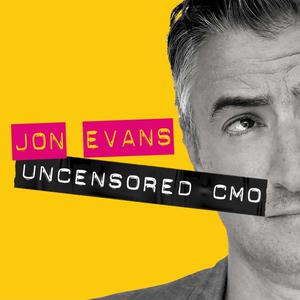 Uncensored CMO
Uncensored CMO
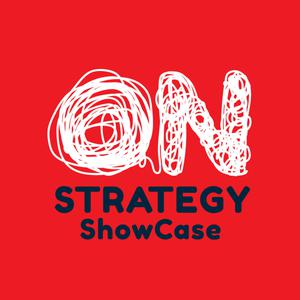 On Strategy Showcase
On Strategy Showcase
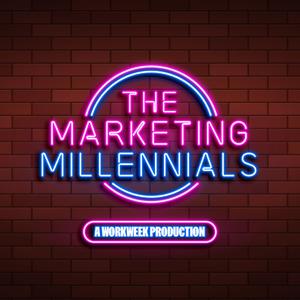 The Marketing Millennials
The Marketing Millennials
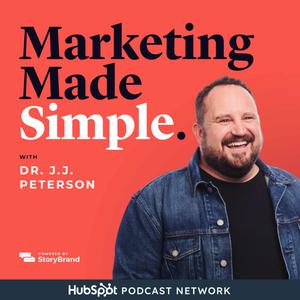 Marketing Made Simple
Marketing Made Simple
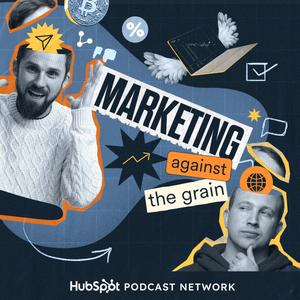 Marketing Against The Grain
Marketing Against The Grain
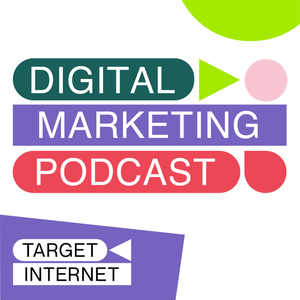 The Digital Marketing Podcast
The Digital Marketing Podcast